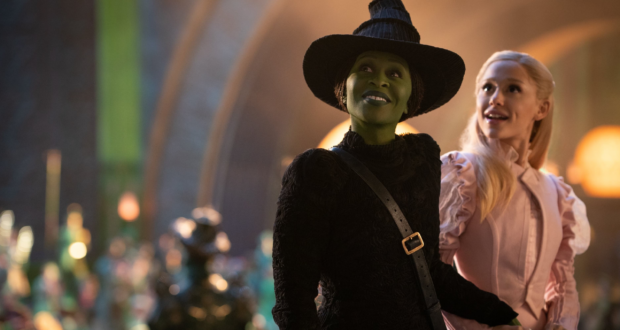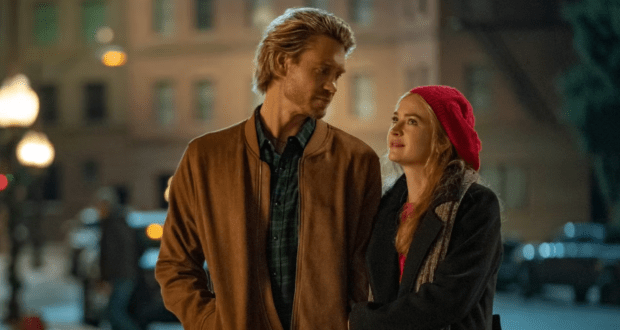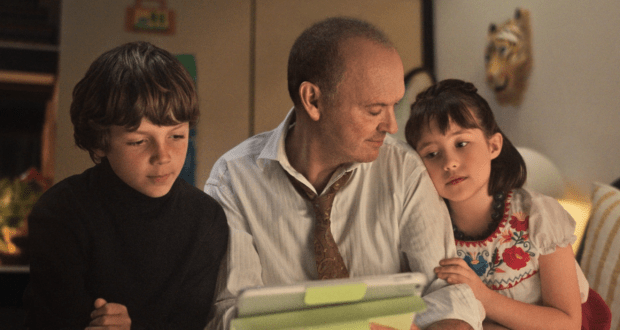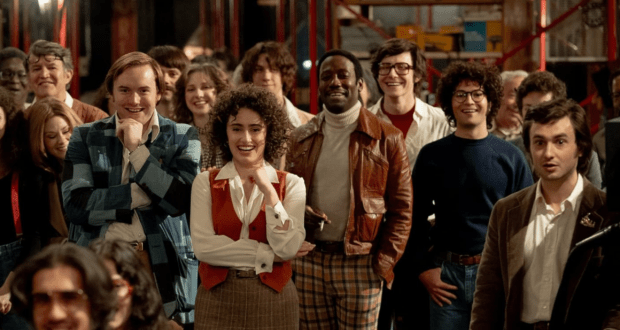Jon M. Chu‘s Wicked, the first of a two-part adaptation of the celebrated Broadway musical, enters the cinematic landscape with high expectations and a dazzling cast. The story reimagines the Land of Oz, chronicling the rise and fall of Elphaba Thropp, who becomes the infamous Wicked Witch of the West, and her poignant friendship with Galinda Upland, later Glinda the Good. While the film successfully captures the musical’s grandiosity and emotional beats, it occasionally falters in its pacing and storytelling cohesion.
A Vibrant World of Oz:
From the opening sequence, Wicked immerses viewers in the whimsical yet politically charged world of Oz. Jon M. Chu brings a cinematic grandeur to the setting, rendering the Emerald City as a vibrant metropolis brimming with life, while Shiz University exudes academic mystique. The production design and visual effects are impeccable, blending fantastical elements with tangible textures that evoke the wonder of the stage show.
The musical numbers are the film’s undeniable highlight. Stephen Schwartz’s iconic songs, including “The Wizard and I” and the soaring anthem “Defying Gravity,” are given new life through lush orchestration and Chu’s dynamic direction. The camera work enhances the choreography, sweeping through scenes with a kinetic energy that pulls the audience into the heart of each performance. However, there are moments when the visual spectacle overshadows character intimacy, leaving quieter emotional beats feeling slightly underdeveloped.
Cynthia Erivo and Ariana Grande:
Cynthia Erivo’s portrayal of Elphaba anchors the film with emotional depth and raw vulnerability. Her performance captures Elphaba’s complex journey from an outcast with dreams of acceptance to a determined figure fighting against injustice. Erivo’s rendition of “Defying Gravity” is a show-stopping moment, her voice carrying the weight of Elphaba’s transformation while embodying her unyielding spirit.
Ariana Grande’s Glinda is also absolutely incredible and brings a huge sense of charm and silliness to the film. She makes for a perfect pairing with Elphaba, who seems like the polar opposite to her in virtually every way. Grande’s comedic timing and facial expressions had my entire theatre rolling with laughter, and it’s not hard to see why. Don’t be surprised if Grande gets nominated at a lot of awards ceremonies coming up here.
The chemistry between Erivo and Grande is central to the film’s success, and while their bond is believable, it sometimes lacks the nuance that makes their friendship both poignant and tragic. Moments of shared vulnerability feel rushed, as if the film is more eager to progress the plot than delve into their connection.
Supporting Cast and Performances:
The supporting cast brings their own flair to the film, though not all are given equal opportunity to shine. Jonathan Bailey as Fiyero is charming but underutilized, his character’s arc feeling more like a subplot than a pivotal thread. Michelle Yeoh commands attention as the manipulative Madame Morrible, delivering a performance that oozes calculated menace. Meanwhile, Jeff Goldblum’s Wizard offers a fascinating blend of charisma and duplicity, though his character’s motivations could have been explored more thoroughly.
Marissa Bode, in her film debut as Nessarose, brings a quiet intensity to her role, creating a compelling dynamic with Erivo’s Elphaba. Peter Dinklage’s brief but impactful appearance as Dr. Dillamond lends gravitas to the film’s exploration of discrimination and systemic oppression.
Narrative Strengths and Weaknesses:
One of the greatest challenges Wicked faces is translating the musical’s intricate plot into a cohesive cinematic experience. Winnie Holzman and Dana Fox’s screenplay largely succeeds in retaining the essence of the stage production, but the film’s pacing occasionally feels uneven. The first half deftly balances character introductions and world-building, but the latter portion rushes through key developments, sacrificing emotional depth for spectacle.
The film shines when it explores its core themes of identity, prejudice, and the corrupting nature of power. Elphaba’s struggle to reconcile her otherness with her desire to do good resonates deeply, and the narrative’s critique of propaganda and political manipulation feels especially timely. However, some subplots—such as the romantic tension between Elphaba and Fiyero or the budding love triangle involving Nessarose—lack the narrative weight they deserve.
Musical Numbers and Direction:
Chu’s handling of the musical numbers is largely effective, infusing each song with cinematic flair while honoring the source material’s spirit. The choreography and staging of “Dancing Through Life” are delightful, capturing the carefree charm of Fiyero’s introduction, while “I’m Not That Girl” delivers a poignant introspection into Elphaba’s unrequited feelings.
“Defying Gravity,” the film’s centerpiece, is an undeniable triumph. Chu’s direction elevates the iconic moment with breathtaking visuals and Erivo’s commanding presence. The sequence encapsulates the film’s potential, blending emotional stakes with awe-inspiring spectacle.
However, not all numbers land with the same impact. “Popular,” while humorous, feels overly polished, losing some of the spontaneity that makes it a fan favorite. Additionally, the film’s reliance on CGI occasionally detracts from the intimacy of character-driven moments, creating a sense of detachment during otherwise pivotal scenes.
A Prelude to Part Two:
As the first installment of a two-part story, Wicked leaves many narrative threads unresolved. While this structure allows for a more thorough exploration of the source material, it also results in a somewhat abrupt ending that may leave viewers feeling unsatisfied. The decision to split the story is a double-edged sword, providing room for character development but risking a loss of momentum between films.
Overall:
Jon M. Chu’s Wicked is an ambitious adaptation that soars in its visual and musical execution but stumbles in its narrative cohesion. Cynthia Erivo’s powerhouse performance as Elphaba and the film’s stunning production design make it a worthwhile cinematic experience, even if it doesn’t fully capture the emotional complexity of the stage musical.
Fans of the original production will appreciate the film’s faithfulness to its source material, though newcomers may find its pacing and character arcs uneven. Ultimately, Wicked lays a strong foundation for its second installment, leaving audiences eager to see how Elphaba’s journey unfolds.
-
Acting - 8/10
8/10
-
Cinematography/Visual Effects - 7.5/10
7.5/10
-
Plot/Screenplay - 4.5/10
4.5/10
-
Setting/Theme - 5/10
5/10
-
Watchability - 5/10
5/10
-
Rewatchability - 2/10
2/10












